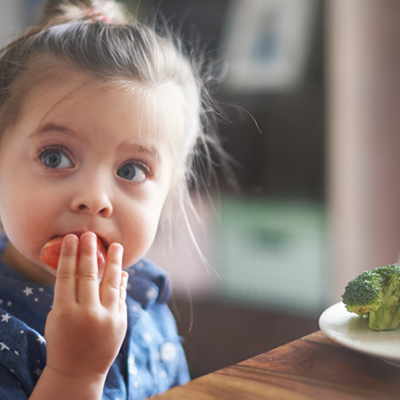Tuesday, 24 March 2020 / Topics:

We often talk about children being “fussy eaters”. The question is are they being fussy or are they just being kids? Or perhaps worse, are they mimicking their parents? I mean do you love steamed cauliflower? If you had a choice would you eat it every second night?
Ultimately, salty, sweet, crunchy and crisp foods are considered desirable by most humans. You can’t really blame kids for liking hot chips and lollies. You like them just as much. The difference is, you know what happens if you eat nothing but hot chips and lollies. Kids don’t. They don’t care, and they are very hard to negotiate with.
So, what can you do? How do you get the “fussiest” eater to eat their vegetables?
1. Be a role model
Do you say one thing but do another? Kids hate hypocrites.
If it’s good enough for them then it’s good enough for you. We all know not to smoke around children because it increases the likelihood of children smoking as they see it as a normal behaviour.
Therefore try eating fruits and vegetables, drinking water and exercising around your kids. Kids want to be just like their parents. Be a positive role model.
2. Play hard ball, seriously
If you need to create a rule or ultimatum to get your child to eat their food, that’s fine, but stick to it. As soon as you waiver, your ultimatum becomes an empty threat. In fact, all of your ultimatums become empty threats and your child will no longer take you seriously.
On the other side, if your child does what you asked, then they must receive the reward, otherwise what’s the incentive of completing the task in the future. Some people call this bribery. Call it what you want, it can be a good way to expose children to a range of foods and allow them to feel more comfortable and confident with them.
As they age the “negotiating” reduces as it isn’t needed as knowledge and reason becomes more powerful.
Also make sure all adults involved in the parenting process are on the same page. We can’t have one adult undermining another. The child will quickly learn where to focus their attention.
3. Make sure your kids are hungry
Don’t introduce new foods to children when they are not hungry.
They simply will not be interested, and this negative experience could create barriers towards future exposures to the food.
4. Make dinner time matter
Make meal time a priority.
Ensure meal times are free from distractions and are considered an important family experience where everyone behaves and is respectful of others and the food provided.
Try to eat dinner at the same time every night as this shapes hunger and appetite patterns.
5. Make sure your kids aren't tired
A tired adult is hard to tolerate and reason with, now multiply this by 100 for a toddler or child.
Ensure children are well rested and happy when eating, especially when introducing new foods.
6. Make food interesting
Make meals, particularly the vegetable component appealing. Ensure you offer a variety of colours, textures and flavour profiles within every meal.
Use spices (this doesn’t mean spicy) and herbs to add flavour and think about the way a meal is consumed, is it kid friendly?
For example is it cut into small pieces, is it fun and playful, does it involve hands, is it the correct temperature?
What we eat as kids is very important. Children who are overweight during childhood are more likely to be overweight into adulthood and develop unhealthy food habits.
While this is true, we all need to take a step back and stress a little less. Literally. We are so focused on every single thing our children eat that food is no longer fun and mealtimes are incredibly stressful. I don’t know about you, but I wouldn’t want to eat dinner with a bunch of adults who are always stressed and looking at everything I do.
We need to facilitate a positive relationship between food and our children. We want our children to grow up enjoying food, recalling positive experiences that involve food and learning to respect and value food.
We don’t want children or their parents classifying foods as good or bad, excluding certain foods or fearing mealtimes, this will ultimately lead to a very negative and anxious relationship with food.
You were a kid once. Did you eat everything your parents gave you? Did you want to sit at the dinner table while the other kids played outside? Try to see food from your kid’s perspective and this will go a long way to helping reduce mealtime stress and improve your child’s intake.

